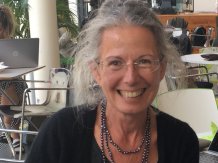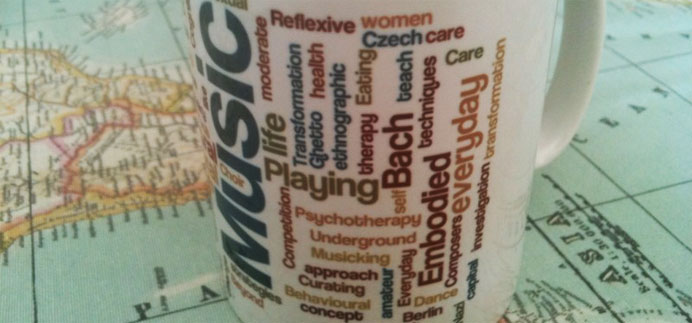
We are linked to the Music and Arts in Action (MAiA) journal, founded in 2008 by a group of SocArts PhD students and now edited by a team of PhD students and postdoctoral scholars.

Professor Tia DeNora elected to prestigious British Academy fellowship. Read more.
SocArts
Welcome to the Sociology of the Arts Group at the University of Exeter (SocArts).
Research in SocArts examines the arts in situations of action and considers the arts as dynamic ingredients in social life and social experience. Our work links sociology with musicology, health humanities, museum studies and conflict transformation.
The SocArts Research Group is directed by Tia DeNora and includes members of staff and PhD researchers in SPA as well as postdoctoral and affiliated researchers based at other institutions. Members of SocArts have expertise in qualitative, ethnographic and sensory methods of research and many of us do comparative or transnational research. Our work is theoretically informed but also grounded in ‘real world’ questions and problems. We share a commitment to producing research that is ecologically valid and linked to people’s actual practices and systems of meaning.
SocArts turned ten in 2016. We celebrated by showcasing our research at The Pebbles in the Pond: SocArts at Ten, in dialogue with the scholars and arts-health activists who have visited us since 2006. It was a rich, inspiring event and very joyful, since it brought everyone who had ever been a member of SocArts together for two days (and the SocArts family now extends to nearly a dozen countries worldwide). Some of the work featured in the event will appear in a special issue of MAiA (Music and the Arts in Action) which will also feature the ways in which SocArts research has found its way into activities and activism.
Theoretically, we are concerned with the culture-agency nexus, new ontologies, emergence, complexity, temporality, material and craft practices, tacit and non-propositional knowledge, consciousness, and embodiment. Empirically, our work investigates how the arts and aesthetic practices more generally (for what is and isn’t art?) can mediate, transform and transcend seemingly ‘given’ physical, social and psychological realities. Current projects focus on the arts, health and wellbeing; aesthetic media as technologies of identity, self and memory; aesthetic and sensory representations of knowledge; and the arts in relation to social cohesion, conflict, and reconciliation.
SocArts has been active since 2004. Its members come from eight countries and speak and work in 10 languages. Work in SocArts has been honoured by the American Sociological Association, the Royal Society for Health Promotion, UK, and the Japan Society for the Promotion of Science. The group includes members of staff and PhD researchers in SPA as well as postdoctoral and affiliated researchers based at other institutions.
Members of SocArts participate in two important networks – the AHRC Being in the Zone Network Grant (run by Open University and KCL, Sociology Departments) and the ESRC Arts, Wellbeing and Health Seminar Group, coordinated from Nottingham University School of School of Nursing, Midwifery & Physiotherapy. We are also linked to two journals. The first of these is Music and Arts in Action (MAiA), founded in 2008 by a group of SocArts PhD students and now edited by a team of PhD students and postdoctoral scholars. The second is the BSA publication, Cultural Sociology, edited by Professor David Inglis.
SocArts hosts symposia, guest lectures and outreach events and has welcomed visiting scholars from around the world. Informal links include: Nordoff Robbins Music Therapy, London, UK; Yale University Center for Cultural Sociology, USA; the University of Edinburgh’s Institute for Music in Human and Social Development; the Center for the Humanities and the Public Sphere, University of Florida; the Nordic Network for Music, Culture and Health (MUCH); and the Graduate School of Human Development and Environment at Kobe University, Japan.
Director |
|
 |
Professor Tia DeNoraProfessor of Sociology of Music and Director of SocArtsA cultural sociologist, and as Director of SocArts co-ordinates the group's activities. |
 |
Dr Joel KruegerLecturer (Philosophy), University of Exeter. |
 |
Dr Tom RiceLecturer (Anthropology), University of Exeter |
 |
Dr Dana Wilson-KovacsLecturer in Sociology at the University of Exeter. |
Members
|
|
Sophia AcordAssociate DirectorDr Sophia Acord is Associate Director of the Center for the Humanities and the Public Sphere at the University of Florida. She obtained her PhD in Sociology from the University of Exeter. Email: skacord@ufl.edu |
|
|
Gary AnsdellHonorary ProfessorGary Ansdell is an Associate of Nordoff Robbins and an Honorary Professor at the University of Exeter. Email: gary.ansdell@nordoff-robbins.org.uk |
|
|
Arild BerghResearcherDr Arild Bergh is currently working as a researcher at the the Norwegian Defence Research Establishment (FFI). He gained his doctorate in Sociology from the University of Exeter in 2010. Email: A.Bergh@exeter.ac.uk |
|
|
Kari Bjerke Batt-RawdenResearcherDr Kari Bjerke Batt-Rawden , Researcher, Eastern Norway Research Institute, [ENRI/Østlandsforskning], Lillehammer, Norway Email: kbr@ostforsk.no |
|
|
Pedro dos Santos BoiaResearch FellowPedro dos Santos Boiais a Research Fellow at CIPEM (Centre for Studies in Music Psychology & Education) at Porto Polytechnic where he is part of the FCT project on the Orquestra Geração/El Sistema in Portugal. Email: psantosboia@gmail.com |
 |
Sigrun Lilja EinarsdottirAssistant Professor, Bifrost University, IcelandProfessor Sigrun Lilja Einarsdottir is Head of Sociology at the Faculty of Social Science, Bifrost University, Iceland Email: sigrunlilja@bifrost.is |
|
|
Pinar Guran AydinResearcherDr Pinar Guran Aydin, New York Public Library Wertheim Scholar Email: pinarguran@hotmail.com |
|
|
Mariko HaraResearcherDr Mariko Hara, Researcher, Kobe University, Japan Email: mh311@exeter.ac.uk |
|
|
Simon ProcterResearch AssociateDr Simon Procter, Research Associate and Director, Master of Music Therapy Training Programme, Nordoff Robbins, London Email: enquiries@nordoff-robbins.org.uk |
 |
Craig RobertsonResearch assistantDr Craig Robertson is working in project development for the University of Exeter in partnership with Leeds University. Email: C.Robertson@leeds.ac.uk |
|
|
Ian SutherlandDeputy Dean for ResearchDr Ian Sutherland is Deputy Dean for Research and Director of PhD Studies at IEDC–Bled School of Management in Slovenia. Email: sutherlandiandamon@gmail.com |
Students
|
|
Rita Gracio AlbertoPhD studentRita Gracio Alberto is a PhD student at the University of Exeter. Email: rsga201@exeter.ac.uk |
|
|
Elizabeth DennisPhD studentElizabeth Dennis, PhD student, University of Exeter Email: liz.dennis@thefiloproject.co.uk |
|
|
Eva SchurigPhD studentEva Schurig, PhD student, University of Exeter Email: es431@exeter.ac.uk |
|
|
Sarah SmithPhD studentSarah Smith, PhD student, University of Exeter Email: slm221@exeter.ac.uk |
Professor Tia DeNora has recently completed a longitudinal project on music and mental health, Music and health in everyday life: Community music therapy with people in challenging healthcare environments. She is currently working on three projects: The first of these considers interaction between music and science in Beethoven's Vienna and beyond. The second, in collaboration with music therapists considers issues of evaluation and evidence in music therapeutic interventions and practices, with a focus on user-perspectives. The third, and most recent, focuses on music and end-of-life.
Dr Sophia Krzys Acord, Associate Director of the Center for the Humanities and the Public Sphere at the University of Florida, is working on 'Sharing and Connecting Our Stories through "Archive Drama", examining how theatre can be a way to connect members of the public to library/museum archives and their own family stories. She also has a grant from the Institute of Museum and Library Sciences to study the incorporation of the Panama Canal Museum into the UF collections, the first integration of a community museum and a research university.
Dr Arild Bergh is working as a researcher at the the Norwegian Defence Research Establishment (FFI), where he is able to utilise his two strands of expertise, social research and IT technology/programming skills. These complementary interests are applied to research around the use of emerging (mobile) technologies focused on interaction and collaboration. Current work includes prototyping a smartphone app builder for use in Advanced Distributed Learning (ADL) and analysis of "big data" drawn from interactions between defence units in six countries and the public through social media.
Dr Sigrún Lilja Einarsdóttir, assistant professor in Social Science at Bifröst University, Iceland is currently working on a self-participative project called ‘From amateur to professional’ where she documents her path from being an amateur singer through her lessons in classical singing. Sigrun is also working on a publication from her PhD thesis and is preparing a book on the concept of ‘Choral Capital.’ She is also working on establishing a network which aims to apply recent research in music and health to treatment options for obesity.
Sigrun has also other research projects that are not related to music or arts; as an example, she is working on a collaborative project on investigating the effect of weight bias on appearance dissatisfaction of obese women in Iceland and preparing and writing a study material for members, workers and managers in cooperatives and social entrepreneurs to-be.
Dr Trever Hagen's research interests target the way in which the arts are an active ingredient in the making of social worlds. His research at Kobe University in Japan involves conducting ethnographic and auto-ethnographic research on musical learning and wellbeing in a health promotion perspective. He employs visual and sound-based research methods to examine changing gestures, parameters of sound (eg volume, intensity), and interaction patterns/associations over a 10-month period in a rehearsal space. In Kobe he works primarily with the ensemble Otoasobi, which brings together children and adults with learning and cognitive disabilities in a collective improvisation setting. He has also worked with an improvising ensemble, 'Sound Play Orchestra', in Hiroshima.
Dr Mariko Hara is researching the use of music as a means for sustainable care in ageing societies (in particular in Japan, the UK and Norway). Dr Hara is particularly interested in how music use can be integrated into everyday life as a resource to help people to adapt to changes in their health and social circumstances.
Dr Joel Krueger works on various issues at the intersection of phenomenology, philosophy of mind, and cognitive science. He is particularly interested in the extended mind thesis: the idea that the physical basis of some cognitive processes may be partially constituted by external resources that lie beyond the boundaries of skin and skull. His recent work on music cognition explores the possibility that music may, at times, become part of the physical vehicle needed to realize certain cognitive and emotional capacities, and that we might therefore be justified in speaking of the musically extended mind.
Dr Simon Procter is researching the project, 'Music therapy - who is it for?'. Music therapy research currently focuses predominantly on demonstrating “evidence of effectiveness” in terms of symptomatic outcome, thus preserving a focus on the individual congruent with the medical model. In contrast, thisresearch seeks to examine ethnographically the ways in which music therapy gets accomplished as a situated social practice within a community mental health resource centre in a UK urban area. It seeks to identify ways in which music therapy gets done and the value ascribed to it. Observations are compared with the “norms” portrayed by dominant professional discourse, and reasons for discrepancies considered. The research seeks both to highlight the often neglected role of clients in the achievement of music therapy as situated social practice and to bring to the fore aspects of the therapist’s craft which are important for training therapists to learn: in this sense it both builds on Dr Procter's experience as a music therapist within mental health services and complements his role as a trainer of future music therapists within Nordoff Robbins in London.
Dr Ian Sutherland’s work occurs at the intersection of the arts and business. In particular his work is focused on leadership practice, creative and strategic processes, leveraging diversity and experiential arts-based methods of management and leadership development. He is a co-founding editor of the journal Music and Arts in Action.
Rita Gracio Alberto's research focuses on the affordances of rock music in everyday life, for women in Portugal. Considering rock music a networked assemblage of aesthetics, human and non-human actors, the research seeks to understand women as rock music “users” and to understand rock music as a template for (embodied) ways of being, doing, thinking, feeling. This includes an in-depth look at how the practices of musicking, for both female musicians and fans, afford well-being and self-care. She also works as a poet in the experimental and performance poetry group “aranhiças & elefantes” ("spiders & elephants"), and with the promoters of Coimbra’s “Poetry Slam”, part of the Portuguese Poetry Slam network.
The research of Pedro dos Santos Boia aims to understand how the viola is seen and explored by violists today, focusing on collaboration between players and instrument makers, playing techniques, repertoire, and performance. The study considers the materiality and the technologies of instruments, as well as processes of psychocultural construction, incorporation, cognition, and embodiment.
The research of Elizabeth Dennis focuses on the lay music practices of people with early to moderate dementia living in the community. In seeking to gain an enhanced understanding of what drives these practices, strands of enquiry include the what, where, when and how of individuals’ private musicking. Elizabeth has established a community interest company, The Filo Project, which provides a day care service for people who have either a diagnosis of dementia or a related condition such as Alzheimer’s disease, those who have no formal diagnosis but are experiencing issues with their memory, and those who are socially isolated.
Pinar Güran's research explores the relationship between music and cultural memory through a study conducted with people from Turkey in Berlin. Music, as one of the cultural and social building blocks of a society, provides a dynamic connection with the past. The meanings attributed to songs on personal and collective levels open a way to relate songs with certain emotions and memories. Berlin has a significant Turkish-speaking community - people from Turkey have migrated to Germany as guest workers since the 1960s. Today there are three generations who experienced different socialisation and integration processes and the shift in the policies of multiculturalism creates another important criterion to look into. Pinar is looking at the use of music in preserving and constructing a cultural memory transmitted through these generations.
Sarah Smith's research aims to investigate the ways in which Dance Movement Psychotherapy (DMP) is experienced by patients and staff within a hospital setting for those with an eating disorders diagnosis. How might the embodied form of DMP, which uses movement as a tool to support group interaction, be understood by those suffering from this extreme form of body image distress? In addition, how might the embodied practices of DMP be viewed, and perhaps even used, by staff members involved in the care of patients who are experiencing such difficulties? In conducting this research, Sarah hopes to add to knowledge bases regarding possible treatment options for this particular area of mental illness. She aims to examine the potential mutual enrichment of the disciplines of DMP and Sociology regarding the topics of dance, movement, and embodiment "in motion".














